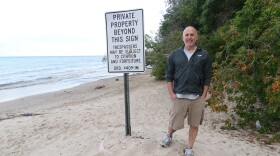October is Breast Cancer Awareness month, which isn't surprising for most people. The breast cancer awareness movement has been incredibly successful and many organizations have cashed in on it. People can buy everything from t-shirts and mugs, to cookies or makeup sponges, all in the pink hue associated with the movement.
But to some, the pink and pretty elements to this movement belie the painful and sometimes deadly realities of having breast cancer. Dr. Amanda Kong and Dr. Laura Field are two people who regularly deal with breast cancer patients.
Dr. Field is an assistant professor of radiology at Froedtert Hospital, and she says that breast cancer awareness ultimately means ensuring that those who are at risk get checked.
She explains, "Being aware is doing regular breast exams, being aware of what your body feels like, so that if there is a change, you’re more likely to detect it sooner than later and taking the right steps."
"Being aware is doing regular breast exams, being aware of what your body feels like, so that if there is a change, you're more likely to detect it sooner than later and taking the right steps."
Part of breast cancer awareness is also knowing about what treatment options look like for patients. Many people are afraid of getting examined because they don't want to learn that they have cancer, but taking those first steps will increase the chance of survival.
Other people are afraid of losing their breasts and what life might look like after they're removed. Dr. Kong is an associate professor of surgery at the Medical College of Wisconsin and its section chief for breast surgery. She says that contrary to what some women may believe, your breast doesn't necessarily need to be removed entirely if you're diagnosed with cancer.
"We know from over 20 years of data that a lumpectomy (removing the cancerous growth) and radiation are equivalent to a mastectomy (removing the entire breast) in terms of survival... When we hear people die of breast cancer, it's not because it comes back in the breast or the chest wall, but it goes to other sites - their liver or their bones - and surgery can't really prevent that," says Kong.






